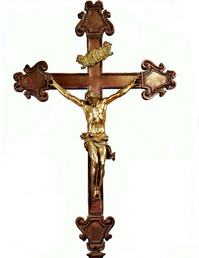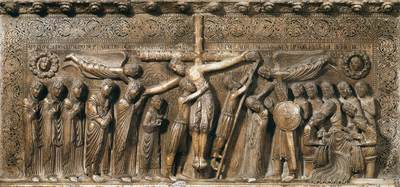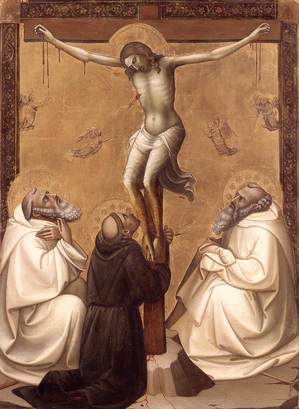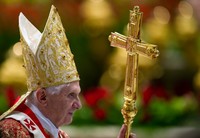The Pope’s homily on the role of the Cross in our theology was a good reminder of who are as a people of faith: merciful, loving, and hope-filled. Sin and death don’t have the last word in life. It is sad that we don’t remember this more often, clergy and laity alike. This homily made me reflect back on an experience I had a few weeks back when I was told a priest in this particular parish preached that Catholics are “Easter people” and not a “Good Friday people.” Sorely misguided. On June 5th in Cyprus Pope Benedict celebrated the Votive Mass of the Holy Cross (praying
the various votive Masses is a good and noble tradition when there is no
specific liturgical memorial that particular day) when he acknowledged the work of
devoted priests, brothers, sisters catechists and the lay movements in preaching and teaching the Truth. In the
face of difficult and sometimes evil situations the Pope encouraged his
congregation (and us) to base their (our) lives on the Cross. For Christians, the cross is not
a failure but the symbol –the reality– of mercy, forgiveness, faith, hope and joy. And it is
the goal of priests and religious to conform their lives to their Cross because
it is at the foot of the Cross that we know the full power of the Trinity’s
love for us. Plus, the Pope reminds us that we are not the center of the faith, Christ is: it is His wisdom and salvation we communicate to others, not our own.
Here are excerpts from the Pope’s homily:
Beguiled by the serpent, Adam had foresaken his filial trust in
God and sinned by biting into the fruit of the one tree in the garden that was
forbidden to him. In consequence of that sin, suffering and death came into the
world. The tragic effects of sin, suffering and death were all too evident in
the history of Adam’s descendants. We see this in our first reading today, with
its echoes of the Fall and its prefiguring of Christ’s redemption.
As a
punishment for their sin, the people of Israel, languishing in the desert, were
bitten by serpents and could only be saved from death by looking upon the
emblem that Moses raised up, foreshadowing the Cross that would put an end to
sin and death once and for all. We see clearly that man cannot save himself
from the consequences of his sin. He cannot save himself from death. Only God
can release him from his moral and physical enslavement. And because he loved
the world so much, he sent his only-begotten Son, not to condemn the world – as
justice seemed to demand – but so that through him the world might be saved. God’s
only-begotten Son had to be lifted up just as Moses lifted up the serpent in
the desert, so that all who looked upon him with faith might have life.
The
wood of the Cross became the vehicle for our redemption, just as the tree from
which it was fashioned had occasioned the Fall of our first parents. Suffering
and death, which had been a consequence of sin, were to become the very means
by which sin was vanquished. The innocent Lamb was slain on the altar of the
Cross, and yet from the immolation of the victim new life burst forth: the
power of evil was destroyed by the power of self-sacrificing love.
The Cross,
then, is something far greater and more mysterious than it at first appears. It
is indeed an instrument of torture, suffering and defeat, but at the same time
it expresses the complete transformation, the definitive reversal of these
evils: that is what makes it the most eloquent symbol of hope that the world
has ever seen. It speaks to all who suffer – the oppressed, the sick, the poor,
the outcast, the victims of violence – and it offers them hope that God can
transform their suffering into joy, their isolation into communion, their death
into life. It offers unlimited hope to our fallen world.
That is why the world
needs the Cross. The Cross is not just a private symbol of devotion, it is not
just a badge of membership of a certain group within society, and in its
deepest meaning it has nothing to do with the imposition of a creed or a
philosophy by force. It speaks of hope, it speaks of love, it speaks of the
victory of non-violence over oppression, it speaks of God raising up the lowly,
empowering the weak, conquering division, and overcoming hatred with love. A
world without the Cross would be a world without hope, a world in which torture
and brutality would go unchecked, the weak would be exploited and greed would
have the final word. Man’s inhumanity to man would be manifested in ever more
horrific ways, and there would be no end to the vicious cycle of violence. Only
the Cross puts an end to it. While no earthly power can save us from the
consequences of our sins, and no earthly power can defeat injustice at its
source, nevertheless the saving intervention of our loving God has transformed
the reality of sin and death into its opposite. That is what we celebrate when
we glory in the Cross of our Redeemer. Rightly does Saint Andrew of Crete
describe the Cross as “more noble, more precious than anything on earth […] for
in it and through it and for it all the riches of our salvation were stored
away and restored to us” (Oratio X; PG 97, 1018-1019).
Dear brother priests,
dear religious, dear catechists, the message of the Cross has been entrusted to
us, so that we can offer hope to the world. When we proclaim Christ crucified
we are proclaiming not ourselves, but him. We are not offering our own wisdom
to the world, nor are we claiming any merit of our own, but we are acting as
channels for his wisdom, his love, his saving merits. We know that we are
merely earthenware vessels, and yet, astonishingly, we have been chosen to be
heralds of the saving truth that the world needs to hear. Let us never cease to
marvel at the extraordinary grace that has been given to us, let us never cease
to acknowledge our unworthiness, but at the same time let us always strive to
become less unworthy of our noble calling, lest through our faults and failings
we weaken the credibility of our witness.
In this Year for Priests, let me
address a special word to the priests present today, and to those who are
preparing for ordination. Reflect on the words spoken to a newly ordained
priest as the Bishop presents him with the chalice and paten: “Understand what
you do, imitate what you celebrate, and conform your life to the mystery of the
Lord’s Cross”. As we proclaim the Cross of Christ, let us always strive to
imitate the selfless love of the one who offered himself for us on the altar of
the Cross, the one who is both priest and victim, the one in whose person we
speak and act when we exercise the ministry that we have received. As we
reflect on our shortcomings, individually and collectively, let us humbly
acknowledge that we have merited the punishment that he, the innocent Lamb,
suffered on our behalf. And if, in accordance with what we have deserved, we
should have some share in Christ’s sufferings, let us rejoice because we will
enjoy a much greater gladness when his glory is revealed.
Watch the YouTube clip on the teaching of Pope Benedict on the Cross



